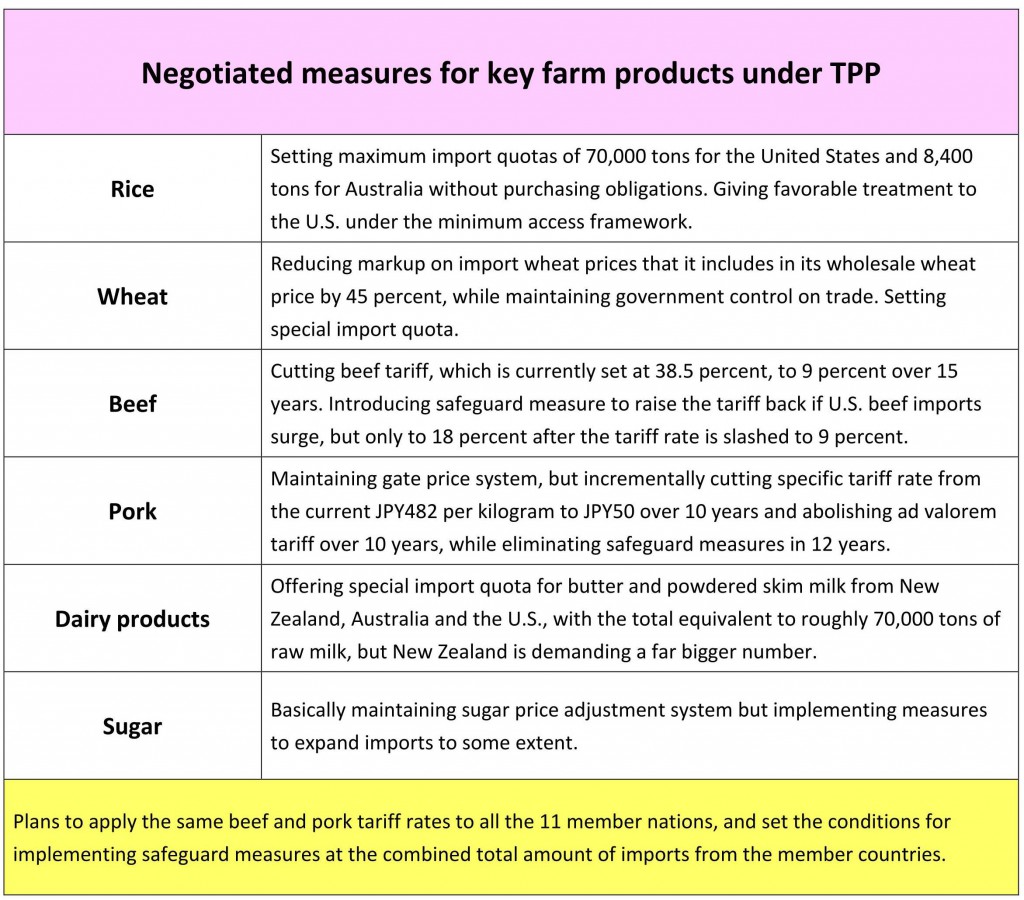Ministers of the member nations of the Trans-Pacific Partnership initiative have failed to reach broad agreement during the latest meeting held in Hawaii, but bilateral negotiations have entered their final stage, except for the most controversial areas such as rice and dairy products. Japan is said to have accepted further market liberalization even for the five key farm products listed in the Diet resolution as subject to exemption from tariff elimination, and the move is highly likely to draw criticism as being contradictory to the resolution. In order to push the talks forward, Akira Amari, minister in charge of the TPP talks, held bilateral talks with his counterparts such as U.S. Trade Representative Michael Froman and New Zealand Trade Minister Tim Groser on the sidelines of the ministerial meeting. Working-level negotiations have also been held to make last-minute adjustments, and Amari hopes to conclude the talks by holding a ministerial meeting again in the end of August. As for rice, Japan has reportedly agreed to create a special import quota outside the minimum access framework for the United States and Australia. It is considering setting a maximum quota of 70,000 tons for U.S. rice and 8,400 tons for Australian rice to be imported under the simultaneous buy and sell tenders, which means buyers are not obligated to purchase. However, the U.S. is asking for the expansion of the quota and import obligations, and the two sides have not reached a compromise. Japan is trying to seek a common ground by giving a favorable treatment to the U.S. also within the minimum access framework. The countries are yet to agree on the area of dairy products as well. Japan is said to be offering a special import quota for butter and powdered skim milk from New Zealand, Australia and the U.S., with the total equivalent to roughly 70,000 tons of raw milk, but New Zealand is demanding a far bigger number. Meanwhile, negotiators appear to be nearing agreement on other items. The government, Japan’s exclusive importer of wheat, plans to reduce the markup on import wheat prices that it includes in its wholesale wheat price by 45 percent. The markup, considered an effective import tariff, is currently set at some JPY17 per kilogram with a ceiling of JPY45.2. Since the funds are used to support domestic wheat producers, reduction could lead to less assistance. The government is proposing a special import quota for wheat and similar measures for barley. Japan is expected to cut its beef tariff, which is currently set at 38.5 percent, to 9 percent over 15 years. It will also introduce a safeguard measure that allows it to raise the tariff back if U.S. beef imports surge, but only to 18 percent after 15 years when the tariff rate is slashed to 9 percent. As for pork, Japan will maintain its gate price differential tariff system and the gate price of JPY524 per kilogram, but has proposed to incrementally cut its specific tariff rate, defined in terms of a specific amount per unit, on low-priced pork from the current JPY482 per kilogram to JPY50 over 10 years. It is considering scrapping over 10 years the ad valorem tariff on higher-priced pork, defined in terms of a fixed percentage of value and currently set at 4.3 percent. Safeguard measures will be eliminated in 12 years. Japan plans to apply the beef and pork tariff rates it negotiated with the U.S. to other TPP member nations, and set the conditions for implementing safeguard measures at the combined total amount of imports from all the member countries. As for sugar products, the government is considering basically maintaining its sugar price adjustment system but implementing measures to expand imports to some extent.  (Aug. 3, 2015)
(Aug. 3, 2015)

